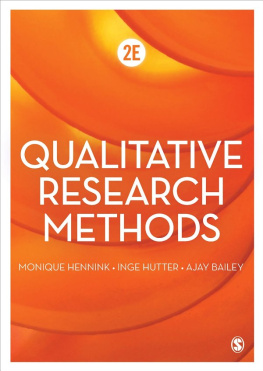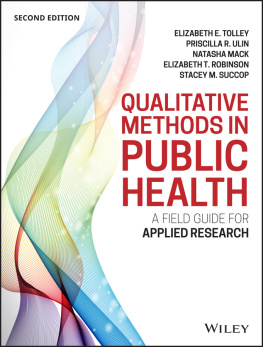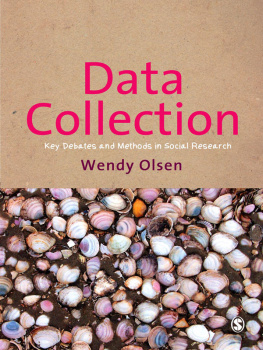Guest Greg - Collecting qualitative data: a field manual for applied research
Here you can read online Guest Greg - Collecting qualitative data: a field manual for applied research full text of the book (entire story) in english for free. Download pdf and epub, get meaning, cover and reviews about this ebook. year: 2012, publisher: SAGE Publications, genre: Politics. Description of the work, (preface) as well as reviews are available. Best literature library LitArk.com created for fans of good reading and offers a wide selection of genres:
Romance novel
Science fiction
Adventure
Detective
Science
History
Home and family
Prose
Art
Politics
Computer
Non-fiction
Religion
Business
Children
Humor
Choose a favorite category and find really read worthwhile books. Enjoy immersion in the world of imagination, feel the emotions of the characters or learn something new for yourself, make an fascinating discovery.

- Book:Collecting qualitative data: a field manual for applied research
- Author:
- Publisher:SAGE Publications
- Genre:
- Year:2012
- Rating:3 / 5
- Favourites:Add to favourites
- Your mark:
- 60
- 1
- 2
- 3
- 4
- 5
Collecting qualitative data: a field manual for applied research: summary, description and annotation
We offer to read an annotation, description, summary or preface (depends on what the author of the book "Collecting qualitative data: a field manual for applied research" wrote himself). If you haven't found the necessary information about the book — write in the comments, we will try to find it.
Guest Greg: author's other books
Who wrote Collecting qualitative data: a field manual for applied research? Find out the surname, the name of the author of the book and a list of all author's works by series.
Collecting qualitative data: a field manual for applied research — read online for free the complete book (whole text) full work
Below is the text of the book, divided by pages. System saving the place of the last page read, allows you to conveniently read the book "Collecting qualitative data: a field manual for applied research" online for free, without having to search again every time where you left off. Put a bookmark, and you can go to the page where you finished reading at any time.
Font size:
Interval:
Bookmark:
Collecting
Qualitative
Data
Collecting
Qualitative
Data
A Field Manual for Applied Research
Greg Guest
FHI 360, Social Research Solutions
Emily E. Namey
FHI 360, Social Research Solutions
Marilyn L. Mitchell
Gray Insight/Insightlink Communications


FOR INFORMATION:
SAGE Publications, Inc.
2455 Teller Road
Thousand Oaks, California 91320
E-mail:
SAGE Publications Ltd.
1 Olivers Yard
55 City Road
London, EC1Y 1SP
United Kingdom
SAGE Publications India Pvt. Ltd.
B 1/I 1 Mohan Cooperative Industrial Area
Mathura Road, New Delhi 110 044
India
SAGE Publications Asia-Pacific Pte. Ltd.
3 Church Street
#10-04 Samsung Hub
Singapore 049483
Publisher: Vicki Knight
Associate Editor: Lauren Habib
Editorial Assistant: Kalie Koscielak
Production Editor: Brittany Bauhaus
Copy Editor: Patrice Sutton
Typesetter: C&M Digitals (P) Ltd.
Proofreader: Jennifer Gritt
Indexer: Diggs Publication Services, Inc.
Cover Designer: Anupama Krishnan
Marketing Manager: Nicole Elliott
Permissions Editor: Adele Hutchinson
Copyright 2013 by SAGE Publications, Inc.
All rights reserved. No part of this book may be reproduced or utilized in any form or by any means, electronic or mechanical, including photocopying, recording, or by any information storage and retrieval system, without permission in writing from the publisher.
Printed in the United States of America
Library of Congress Cataloging-in-Publication Data
Guest, Greg, 1963
Collecting qualitative data: a field manual for applied research / Greg
Guest, Emily E. Namey, Marilyn L. Mitchell.
p. cm.
Includes bibliographical references and index.
ISBN 978-1-4129-8684-7 (pbk.)
1. Qualitative research. 2. Social sciencesResearch. I. Namey, Emily E. II. Mitchell, Marilyn L. III. Title.
H62.G829 2013
001.42dc23 2012009523
This book is printed on acid-free paper.
12 13 14 15 16 10 9 8 7 6 5 4 3 2 1
Researchers (and nonresearchers) around the world are increasingly utilizing qualitative data collection methods. Participant observation, focus groups, and in-depth interviews are now commonly practiced across a diverse range of research-oriented fields including marketing, behavioral and social sciences, public health, international development, public policy, and program evaluation. Surprisingly, few resources exist to provide researchers and, perhaps more importantly, up-and-coming researchers, with practical, step-by-step instruction on how to prepare for, implement, and manage qualitative data collection activities in the field.
The three of us have designed, managed, and conducted qualitative research in each of the major research sectorsacademic, nonprofit, corporate, and government. Our combined research experience also spans dozens of countries, where we have both taught qualitative data collection methods and overseen their implementation. Based on this experience, we have found that most applied researchers are concerned with learning and improving the skills necessary for executing a credible and effective qualitative study. It is these skills, developed over the years through academic study and practical trial and error in varied contexts, that we impart in this book.
Many existing qualitative methods books focus on ongoing epistemological debates that divide certain sectors of academia. Admittedly, there are interesting philosophical questions associated with these debates that constitute an integral part of the academic experience for students in research-oriented disciplines. However, books that focus primarily on these questions do little to provide instruction on how to actually carry out research, particularly research with an applied focus. Our primary purpose in writing this book is to fill this practicality gap by providing a pragmatically driven manual that researchers of all types can use to enhance the design and conduct of qualitative research projects. Each chapter provides instructions on how to implement the methods outlined. We walk readers through each data collection method, with explanations, cautionary notes, examples, and templates along the way.
So what exactly makes this approach unique? The distinct features of this book that we feel set it apart from other texts include the following:
- A cross-disciplinary approachThis book is written for audiences across the entire spectrum of qualitative research; it is not specific to a particular discipline or research sector.
- A how-to formatThe book provides practical (field-tested) information on the logistics of planning and conducting qualitative data collection. For each topic covered, we include illustrative examples, step-by-step instructions, and concrete tools and templates.
- An accessible styleWe minimize theoretical or discipline-specific jargon and provide real-world examples, drawn from our diverse research experience, wherever possible.
- A well-balanced scopeThis book covers the three most common forms of qualitative data collection used worldwideparticipant observation, in-depth interviews, and focus groupsin one text. It also includes instruction on additional qualitative data collection methods, such as free-listing, pile sorts, ethnographic decision modeling, document analysis, and projective techniques.
- A current perspectiveAll three authors are active applied researchers. The book references many of the technological advancements relevant to the qualitative research world (e.g., digital recording, Livescribe, remote interviewing).
- Focused coverage of research ethicsWe devote an entire chapter to research ethics, both the general aspects and those that relate specifically to qualitative research.
- A practical guide to data management describes the main principles behind good data management and includes practical guidance, tools and templates for readers to use and adapt to their own research situation.
- Explicit inclusion of an international perspectiveWe draw upon our international and cross-cultural experience to provide readers with essential considerations for working in foreign cultures.
The book begins with an introductory chapter on qualitative research. It outlines the diversity of perspectives in the field and positions the books contents relative to those perspectives. cover the three most commonly employed qualitative data collection methodsparticipant observation, in-depth interviews, and focus groups, respectively. In addition to instructions for executing each of these methods, these chapters also include discussions on some of the recent technological advancements in the field and their implications for data collection (e.g., Internet and/or phone interviews and focus groups, digital recording, and note-taking).
The data collection methods outlined in , as well as document analysis. Unlike the other methods covered in this book, document analysis is not a form of data generation, but it is considered by many to be a constituent component of qualitative research so we have opted for its inclusion.
Data management is probably one of the most neglected topics in the qualitative methods literature. And those sources that do cover it tend to conflate data management with data analysis or treat it as a synonym for qualitative data analysis software. In , the final chapter, details research ethics in qualitative research. In contrast to other books, which tend to place ethical discussions nearer to the front, we have chosen to include a summary of ethical research practices as a concluding chapter, based on our belief that in order for readers to relate research ethics principles to qualitative research, they first need to be familiar with what qualitative research entails.
Next pageFont size:
Interval:
Bookmark:
Similar books «Collecting qualitative data: a field manual for applied research»
Look at similar books to Collecting qualitative data: a field manual for applied research. We have selected literature similar in name and meaning in the hope of providing readers with more options to find new, interesting, not yet read works.
Discussion, reviews of the book Collecting qualitative data: a field manual for applied research and just readers' own opinions. Leave your comments, write what you think about the work, its meaning or the main characters. Specify what exactly you liked and what you didn't like, and why you think so.





